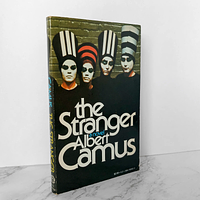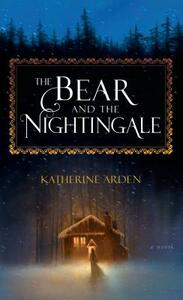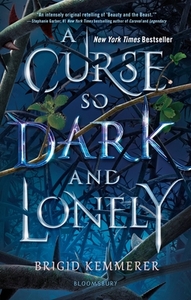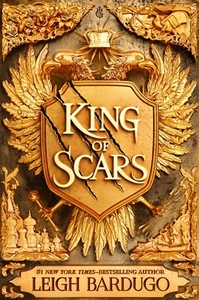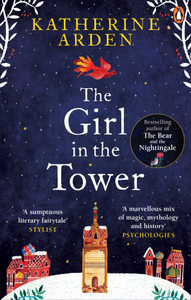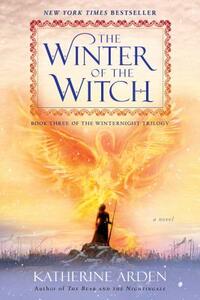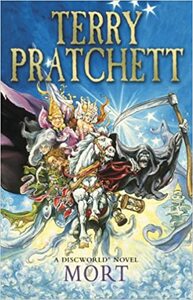You need to sign in or sign up before continuing.
Take a photo of a barcode or cover
theinquisitxor's Reviews (804)
"I would walk into the jaws of hell itself, if it were a path of my own choosing. I would rather die tomorrow in the forest than live a hundred years of the life appointed me."
I have wanted to read this book since it was first released in 2017 and finally got my hands on the trilogy for my birthday a few weeks ago. In all this time, I never knew quite what to expect from this novel, and I managed to avoid spoilers quite well. Still, I was worried that with all the hype for this series, it would not live up to my expectations. But man, it exceeded my expectations by far. I have always been a fan of Russian and Russian based Literature and this book takes place in the wilderness of medieval Russia. The clashes between Christianity and the pagan practices was hugely interesting, and this conflict frames the entire book.
Reading this in winter was perfect, with snow on the ground, and a chilling wind outside I had the perfect setting for this story. Vasilisa is great character who is determined to protect her family while still trying to seek her own destiny and fate. I can't wait to follow her on the rest of her journey throughout the other two books.
I have seen some complaints about the beginning of the book being slow and setting up the characters and family, but I did not mind this part. In my opinion, it is better to have a slower, more in-detail set-up than to leave me trying to figure out who is who. Once Vasya grows up the story really takes off. The rest was absolutely great. From the characters, to the folklore, to the action, I have no complaints about anything. I love Vasya's interaction and relationship with the horses. As someone who has spent most of her life around horses, I really enjoyed reading these parts. Morozoko is not quite what I was expecting, but I am looking forward to see how that relationship progresses. In all- this was a wonderful fairy tale and I can't wait to start the next book!
I have wanted to read this book since it was first released in 2017 and finally got my hands on the trilogy for my birthday a few weeks ago. In all this time, I never knew quite what to expect from this novel, and I managed to avoid spoilers quite well. Still, I was worried that with all the hype for this series, it would not live up to my expectations. But man, it exceeded my expectations by far. I have always been a fan of Russian and Russian based Literature and this book takes place in the wilderness of medieval Russia. The clashes between Christianity and the pagan practices was hugely interesting, and this conflict frames the entire book.
Reading this in winter was perfect, with snow on the ground, and a chilling wind outside I had the perfect setting for this story. Vasilisa is great character who is determined to protect her family while still trying to seek her own destiny and fate. I can't wait to follow her on the rest of her journey throughout the other two books.
I have seen some complaints about the beginning of the book being slow and setting up the characters and family, but I did not mind this part. In my opinion, it is better to have a slower, more in-detail set-up than to leave me trying to figure out who is who. Once Vasya grows up the story really takes off. The rest was absolutely great. From the characters, to the folklore, to the action, I have no complaints about anything. I love Vasya's interaction and relationship with the horses. As someone who has spent most of her life around horses, I really enjoyed reading these parts. Morozoko is not quite what I was expecting, but I am looking forward to see how that relationship progresses. In all- this was a wonderful fairy tale and I can't wait to start the next book!
This story is about a girl, Harper, from Washington D.C. who is taken from her terminally ill mother, and older brother who is in trouble with a local group of criminals to a fantasy world where she must fall in love to break the curse on the kingdom. This is obviously a retelling of BATB, but I thought it was a fresh retelling that had its own original elements.
I have several mixed feeling about this book. On one hand I liked it, but I also recognize that it is not perfect. It is very YA, which it ok, but I feel like I am bit bit too old to really like this book as much as I should have. Perhaps me from three or four years ago would be fawning over this book, but not really anymore. I also felt that the world building was a little weak, and some of the plot concerning details about the way the world system works felt weak. For example, the explanations given to the people of Emberfall (the fantasy world) did not seem to be realistic enough. If I were a citizen, I think I would see through the lie/story easily. I also did not care too much for the villain. She feel flat and I do not like the whole idea of a 'woman scorned' to be the reason for becoming the villain.
I also don't think I connected to the characters enough to really fall in love with any of them (hehe.. get it). The character I liked the most was Harper. She was great, the way she did not let her disability get in her way (high functioning Cerebral Palsy), or how she took matters into her own hands when the men of the story were too distracted to see the real problems made her very likable, and someone to look up to. I knew I would adore her as soon as she was introduced. I don't think the book explicitly says so, but I did imagine her as a person of color. Either way, she brought in some good rep.
Many reviews claim Grey to be the favorite character, and I can see why. He was very well developed and was probably better written than Rhen. (Even though Rhen might be the weakest written of the three main characters, I still really liked him). I am a little confused on the last chapter however. I went back and read it twice but I still do not understand it entirely. I guess I'll have to read the next book when it comes out. The interactions between our modern world and the world of Emberfall was hilarious to me. There were several times that I laughed. I think any person from our world suddenly put into a fantasy world and vice versa is going to be comical.
I have so many mixed emotions about this book that I'm not sure I can write all of them down. On one hand, I thought this was a very good book, but it did not have quite the awesomeness of a five-star book. I'm one of those people who liked SoC and CK better than the Grisha Trilogy and this book definitely falls into the category of a Grisha book, which is maybe part of the reason I did not love it as much as SoC. Secondly, many parts of this book felt fairy-taleish? And I did not care for that overall vibe. I enjoy the realistic parts of the Grisha world (which was mainly highlighted in SoC). I adored reading The Language of Thorns, and I feel like Bardugo drew heavily on the themes of those short stories for this book.
One thing that I did not mind is the plot pacing. I have seen a lot of people complain about how slow the book seems at some parts, but that did not bother me- but I usually like books with a slower plot anyways. Last two things that I did not really like: It felt a little like FanFiction? Some of the events seemed as if it came out of a really great fanfiction. Which I am kinda laughing at that thought, but its true. I think Bardugo made it work, even if some of the ideas felt a little off. Lastly: I still do not know if I liked the ending at all. Again-it felt a little like Fanfiction. But I am curious to see how Bardugo continues this. I did really enjoy reading this and I am really looking forward to whatever happens next. The characters got me hooked and so did all the magic of Bardugo's writing and world-building.
I am going to put some spoilers under this (because I need to share my thoughts) : I think that Darkling should have been left alone. I feel like he died, and he should stay dead, especially after all the Alina went through and the fact that she is still alive, all that she did seems worthless now. And the whole thing with the saints also was a bit too fantasy-like for my taste. I know this review may seem really negative, but I promise, I really did like this book! I continued to love all the characters. Nikolai was charming as ever, but we also got more of a feel of who he really is. I never had really cared much for Zoya in the other series, but boy I stan her now. And I had suspicions going into the book that Bardugo would try to pair up Nikolai and Zoya, which I was hesitant about, but now I am all for it. I adored Nina's story. I got so emotional when she was trying to say goodbye to Matthias and find a proper place to bury him. The way that she was still able to hear him broke my heart and I secretly wished that Nina would still be able to bring him back. And TRASSEL. That part also hurt, but I hope those two do eventually find each other. I am also very excited for Hanne and what she and Nina will do together to bring change to Fjerda (and hopefully get a little romance too!) Anyway, my rant is over but I am excited to see what happens in the next book!
One thing that I did not mind is the plot pacing. I have seen a lot of people complain about how slow the book seems at some parts, but that did not bother me- but I usually like books with a slower plot anyways. Last two things that I did not really like: It felt a little like FanFiction? Some of the events seemed as if it came out of a really great fanfiction. Which I am kinda laughing at that thought, but its true. I think Bardugo made it work, even if some of the ideas felt a little off. Lastly: I still do not know if I liked the ending at all. Again-it felt a little like Fanfiction. But I am curious to see how Bardugo continues this. I did really enjoy reading this and I am really looking forward to whatever happens next. The characters got me hooked and so did all the magic of Bardugo's writing and world-building.
I am going to put some spoilers under this (because I need to share my thoughts) :
“Every time you take one path, you must live with the memory of the other: of a life left unchosen. Decide as seems best, one course or the other; each way will have its bitter with its sweet.”
This is such as lush, evocative trilogy, and Arden has done such a good job of creating the atmosphere and making very beautiful books. Hands down, this is the best book cover ever. I could stare at it all day and take in the details. This book has a faster plot and more things happen, but I can't quite like it as much as the first one. I think I enjoyed the setting of the first book more. But as the minutes go by and I am processing all that happened in this book, I still find it to be a very good second novel.
My favorite part of this novel was the beginning, when Vasya is a 'traveler' and sets out to see the world. Once she got roped into the politics and struggles of Moscow, I think the story lost a bit of it's wild, untamed nature that was present in the first book and beginning of this one. However, I loved meeting with Vasya's siblings again and getting to know them more. Other events also made the time spent in Moscow worthwhile (I won't get into them here for spoilers sake) and I connected to Vasya so much when she is struggling to find her purpose in the world and discover what she wants in life. Those lines spoke to me and I feel like we get a lot of characters who know their purpose and destiny (to some degree) but reading about a character who does not quite know what she wants was refreshing.
I also do not think that I connected quite as much to Morozoko as some other readers, but I will admit the last dialogue with him was a little heartbreaking. I have the last book sitting here next to me, which I will probably start tomorrow. Based off reviews about it, I better prepare myself for some serious heartbreak.
This is such as lush, evocative trilogy, and Arden has done such a good job of creating the atmosphere and making very beautiful books. Hands down, this is the best book cover ever. I could stare at it all day and take in the details. This book has a faster plot and more things happen, but I can't quite like it as much as the first one. I think I enjoyed the setting of the first book more. But as the minutes go by and I am processing all that happened in this book, I still find it to be a very good second novel.
My favorite part of this novel was the beginning, when Vasya is a 'traveler' and sets out to see the world. Once she got roped into the politics and struggles of Moscow, I think the story lost a bit of it's wild, untamed nature that was present in the first book and beginning of this one. However, I loved meeting with Vasya's siblings again and getting to know them more. Other events also made the time spent in Moscow worthwhile (I won't get into them here for spoilers sake) and I connected to Vasya so much when she is struggling to find her purpose in the world and discover what she wants in life. Those lines spoke to me and I feel like we get a lot of characters who know their purpose and destiny (to some degree) but reading about a character who does not quite know what she wants was refreshing.
I also do not think that I connected quite as much to Morozoko as some other readers, but I will admit the last dialogue with him was a little heartbreaking. I have the last book sitting here next to me, which I will probably start tomorrow. Based off reviews about it, I better prepare myself for some serious heartbreak.
“There are no monsters in the world, and no saints. Only infinite shades woven into the same tapestry, light and dark. One man’s monster is another man’s beloved. The wise know that.”
It's been a few hours since I finished this book and I still can't quite form what I want to say. I thought this was a beautiful, stunning and heartbreaking last book. I felt constantly surrounded by the atmospheric magic of the story, and I felt a sense of loss after finishing this book, something I have not felt after reading a book in a while. I was so caught up in the characters, the magic, the history and the writing that when I finished the book, I did feel this strange sense of loss and nostalgia.
This book had even more darker elements than the first two books. Within the first 50 pages one of the worst things happens to Vasya, and that effects her mentally throughout the rest of the book. Vasya's character developed so much in this book, and I can't help from absolutely loving her. She does the impossible in this book, and becomes someone so much more than the girl in the first and second books. This is one series that I could probably pick up the first book and start reading again right away- not because I felt like I missed things, but because I want to go right back into Vasya's world and savor each moment.
It's been a few hours since I finished this book and I still can't quite form what I want to say. I thought this was a beautiful, stunning and heartbreaking last book. I felt constantly surrounded by the atmospheric magic of the story, and I felt a sense of loss after finishing this book, something I have not felt after reading a book in a while. I was so caught up in the characters, the magic, the history and the writing that when I finished the book, I did feel this strange sense of loss and nostalgia.
This book had even more darker elements than the first two books. Within the first 50 pages one of the worst things happens to Vasya, and that effects her mentally throughout the rest of the book. Vasya's character developed so much in this book, and I can't help from absolutely loving her. She does the impossible in this book, and becomes someone so much more than the girl in the first and second books. This is one series that I could probably pick up the first book and start reading again right away- not because I felt like I missed things, but because I want to go right back into Vasya's world and savor each moment.
Shall Truth fail to keep her word,
Justice Divine not hasten to be just?
But Death comes not at call, Justice Divine
Mends not her slowest pace for prayers or cries.
O woods, O fountains, hillocks, dales and bow'rs,
With other echo late I taught your Shades
To answer, and resound far other song.
These are some of my favorite lines from Paradise Lost (Book 10 lines 886-863). I read this for my British Literature class this semester and I find it hard to rate a book like this. On one hand, this is the first epic poem that I have read and I have no others to compare it to. Reading this for a college class with a great professor and a great class has made me enjoy it much more than if I had read it entirely on my own. There are so many things to talk about in Paradise Lost and a simple review will not even begin to cover half of the things.
For Milton to dictate this poem while he was blind astounds me, and I think there is something to be said for a blind man writing about the darkness of hell. The poem starts out with a very epic, awesome anti-hero, Satan. You can't help but like him and his fiery lake, legions of demons and superiority complex. God and Heaven fall a bit flat in the beginning, but that's what Milton wants you to feel. He wants you to be tempted by the bad guy and to think "hey, Satan isn't too wrong" but slowly, as the fall and evilness overwhelm him, he changes- and in the end, he simply slithers away and kind of fades away in the final scene of hell. By the end of the poem, you are now rooting for the two protagonists, Adam and Eve.
Adam and Eve are two interesting characters. As the protagonists of Epics go, they are certainly no Odysseus, or Aeneas. They are two humans who make a mistake that costs the rest of humanity because of it. This poem is more focused on unity, and working together. When Adam and Eve are separated, and mad at each other is when both display their worst attributes. The one thing that got me while reading this was the blatant misogyne. There are some parts of the poem that are very harsh on Eve and these parts made me extremely frustrated. Part of me understands the time period this poem was written in, but another part of me can't stop seeing how in the story of Adam and Eve, through its biblical context, is a story that has helped promote over 2000 years of misogynistic views.
As much as Milton degrades Eve at points, he also writes Eve as a character who was created not equal to Adam, but one that has the potential to be, and this potential is what drives her to eat the fruit. We came to the conclusion in class that it is God's fault for the fall. If He had created Eve as an equal and had not excluded her from certain conversations, she might not have been tempted. Despite this, there is a part in Book 10 that (as my professor believes) makes Eve the true protagonist of the poem. While Adam is in despair, and on a path that shows some similarities to Satan, it is Eve who is the intervening force that quite literally saves Adam (and possibly the rest of the human race). I argue that Eve is more the hero of the two because of this scene, and it does present a different view from the degrading things we've been hearing about her so far.
The very last line of the poem are some of the best. I can't imagine how much time Milton spent on crafting the last lines because they sum up so many themes of the entire poem. Themes of leaving home, possibility, choice, union out of multiplicity, and ultimately of hope.
Some natural tears they dropped, but wiped them soon;
The World was all before them, where to choose
Their place of rest, and Providence their guide:
They hand in hand with wandering steps and slow,
Through Eden took their solitary way.
My university offers courses just on Milton and Paradise Lost, and down the road, I hope to take one of these course myself. Re-visiting this poem and spending an entire semester on it sounds like something I would like to do. This review turned into a bit of a essay, but I had a lot of thoughts I needed to share!
Justice Divine not hasten to be just?
But Death comes not at call, Justice Divine
Mends not her slowest pace for prayers or cries.
O woods, O fountains, hillocks, dales and bow'rs,
With other echo late I taught your Shades
To answer, and resound far other song.
These are some of my favorite lines from Paradise Lost (Book 10 lines 886-863). I read this for my British Literature class this semester and I find it hard to rate a book like this. On one hand, this is the first epic poem that I have read and I have no others to compare it to. Reading this for a college class with a great professor and a great class has made me enjoy it much more than if I had read it entirely on my own. There are so many things to talk about in Paradise Lost and a simple review will not even begin to cover half of the things.
For Milton to dictate this poem while he was blind astounds me, and I think there is something to be said for a blind man writing about the darkness of hell. The poem starts out with a very epic, awesome anti-hero, Satan. You can't help but like him and his fiery lake, legions of demons and superiority complex. God and Heaven fall a bit flat in the beginning, but that's what Milton wants you to feel. He wants you to be tempted by the bad guy and to think "hey, Satan isn't too wrong" but slowly, as the fall and evilness overwhelm him, he changes- and in the end, he simply slithers away and kind of fades away in the final scene of hell. By the end of the poem, you are now rooting for the two protagonists, Adam and Eve.
Adam and Eve are two interesting characters. As the protagonists of Epics go, they are certainly no Odysseus, or Aeneas. They are two humans who make a mistake that costs the rest of humanity because of it. This poem is more focused on unity, and working together. When Adam and Eve are separated, and mad at each other is when both display their worst attributes. The one thing that got me while reading this was the blatant misogyne. There are some parts of the poem that are very harsh on Eve and these parts made me extremely frustrated. Part of me understands the time period this poem was written in, but another part of me can't stop seeing how in the story of Adam and Eve, through its biblical context, is a story that has helped promote over 2000 years of misogynistic views.
As much as Milton degrades Eve at points, he also writes Eve as a character who was created not equal to Adam, but one that has the potential to be, and this potential is what drives her to eat the fruit. We came to the conclusion in class that it is God's fault for the fall. If He had created Eve as an equal and had not excluded her from certain conversations, she might not have been tempted. Despite this, there is a part in Book 10 that (as my professor believes) makes Eve the true protagonist of the poem. While Adam is in despair, and on a path that shows some similarities to Satan, it is Eve who is the intervening force that quite literally saves Adam (and possibly the rest of the human race). I argue that Eve is more the hero of the two because of this scene, and it does present a different view from the degrading things we've been hearing about her so far.
The very last line of the poem are some of the best. I can't imagine how much time Milton spent on crafting the last lines because they sum up so many themes of the entire poem. Themes of leaving home, possibility, choice, union out of multiplicity, and ultimately of hope.
Some natural tears they dropped, but wiped them soon;
The World was all before them, where to choose
Their place of rest, and Providence their guide:
They hand in hand with wandering steps and slow,
Through Eden took their solitary way.
My university offers courses just on Milton and Paradise Lost, and down the road, I hope to take one of these course myself. Re-visiting this poem and spending an entire semester on it sounds like something I would like to do. This review turned into a bit of a essay, but I had a lot of thoughts I needed to share!
This was my first Discworld book that I’ve read which was for the book club I’m in, and I really enjoyed it! Definitely will have to read the more of the discworld books. I know everyone says this, but Terry Pratchett is such a good writer and the humor in this book made it a lot of fun to read.
I read this for my British Literature class and this sure is an interesting little proto-novel. I’m glad to know that Aphra Behn is becoming a more known and studied author within the past 20 years, especially since she was largely forgotten for a few centuries.
It’s one I was looking forward to reading, but overall I thought it was okay. It does raise the question of slavery to nation involved in the slave trade, but it does have its faults. I’m going to be using this text for a part of my final paper so over the next 2 weeks I’ll be looking at it much closer.
It’s one I was looking forward to reading, but overall I thought it was okay. It does raise the question of slavery to nation involved in the slave trade, but it does have its faults. I’m going to be using this text for a part of my final paper so over the next 2 weeks I’ll be looking at it much closer.
I chose the topic of Anna Komene for my Medieval History course paper. I've always kinda known about who Anna was, but researching this topic has brought me to a whole other level understanding, and I also got to finally read her history, The Alexiad, which has been on my tbr for a while now. Anna was a Byzantine Princess in the late 11th century and early 12th century. She is most known for her book that she wrote about the reign of her father, as well as her attempted usurpation of her brother. She would not have been able to do any of this without the education she received. This is a remarkable education of a woman of this time, and Anna was someone who clearly loved learning and valued her education above almost all else- which is something I can admire about her.
Her Alexiad is the story of her father, Emperor Alexois I. It follows the conventions of ancient Greek writing and Anna tried very hard to emulate the Iliad. I do not know a whole lot about Byzantium, so parts of this history went completely over my head and these parts I merely skimmed. Other parts were incredibly interesting and such a wonderful insight to how Anna thought and her personality shines through on many occasions. She loved Aristotle, formed her own literary circle with her husband that had some of the most prominent intellectuals in Constantinople and read works deemed too immoral for women to read. A lot of people may tell you that she studied in secret at night and read Homer by candle light, but there is no factual proof of this. She was a princess and heir to her father for several years, so it is a great possibility that she was allowed such an extensive education.
My paper goes into detail about the education she received and what she studied. It also discusses how Anna most likely did not care too much about societal gender barriers growing up as a Princess because everything was automatically assumed to her. It would't be until later when she was writing her history in semi-exile that she would have to address the problem of a gender barrier as a woman writer. She surpasses this barrier masterfully, and this is mainly due to her extensive training in rhetoric. Her education is the reason why she is still being studied today and she will probably always remain one of my favorite historical people.
Her Alexiad is the story of her father, Emperor Alexois I. It follows the conventions of ancient Greek writing and Anna tried very hard to emulate the Iliad. I do not know a whole lot about Byzantium, so parts of this history went completely over my head and these parts I merely skimmed. Other parts were incredibly interesting and such a wonderful insight to how Anna thought and her personality shines through on many occasions. She loved Aristotle, formed her own literary circle with her husband that had some of the most prominent intellectuals in Constantinople and read works deemed too immoral for women to read. A lot of people may tell you that she studied in secret at night and read Homer by candle light, but there is no factual proof of this. She was a princess and heir to her father for several years, so it is a great possibility that she was allowed such an extensive education.
My paper goes into detail about the education she received and what she studied. It also discusses how Anna most likely did not care too much about societal gender barriers growing up as a Princess because everything was automatically assumed to her. It would't be until later when she was writing her history in semi-exile that she would have to address the problem of a gender barrier as a woman writer. She surpasses this barrier masterfully, and this is mainly due to her extensive training in rhetoric. Her education is the reason why she is still being studied today and she will probably always remain one of my favorite historical people.
